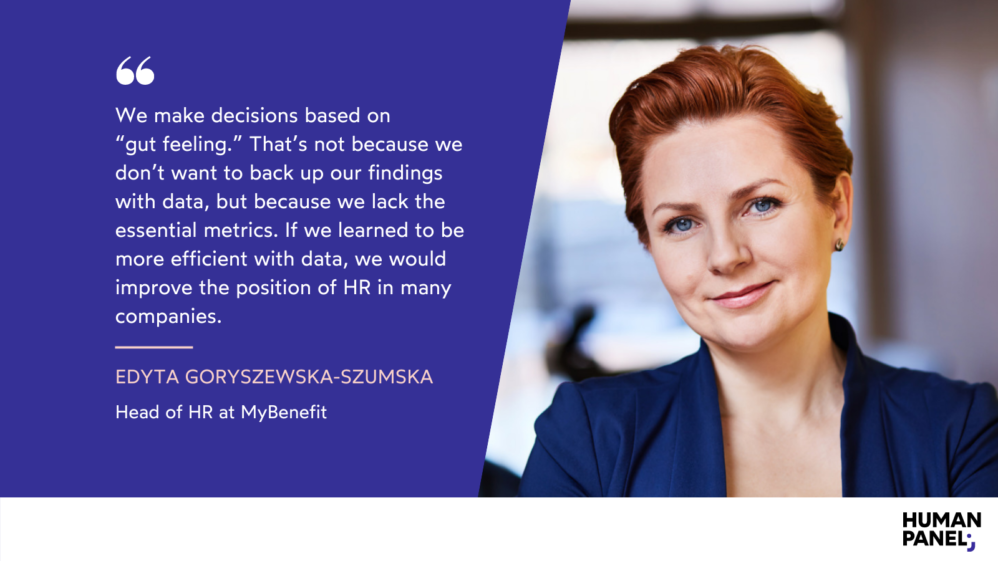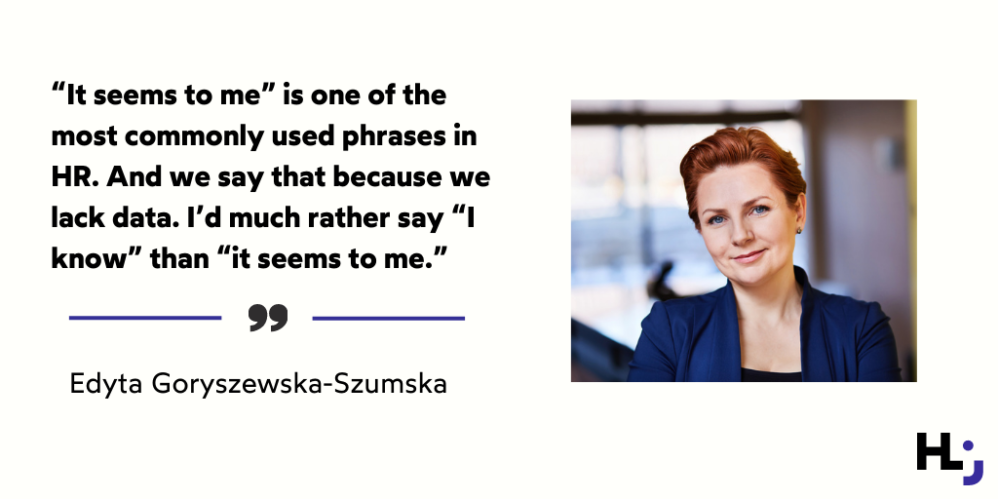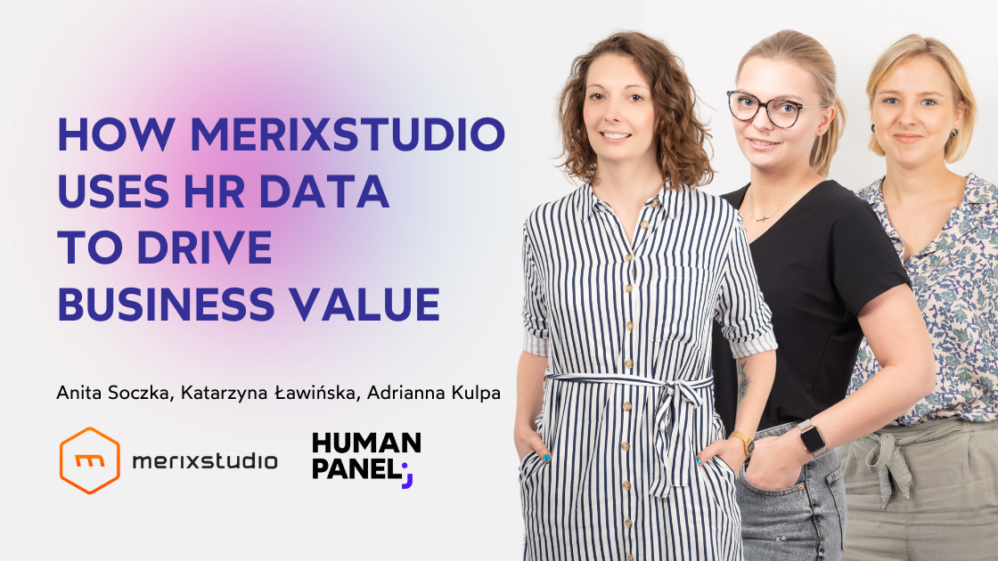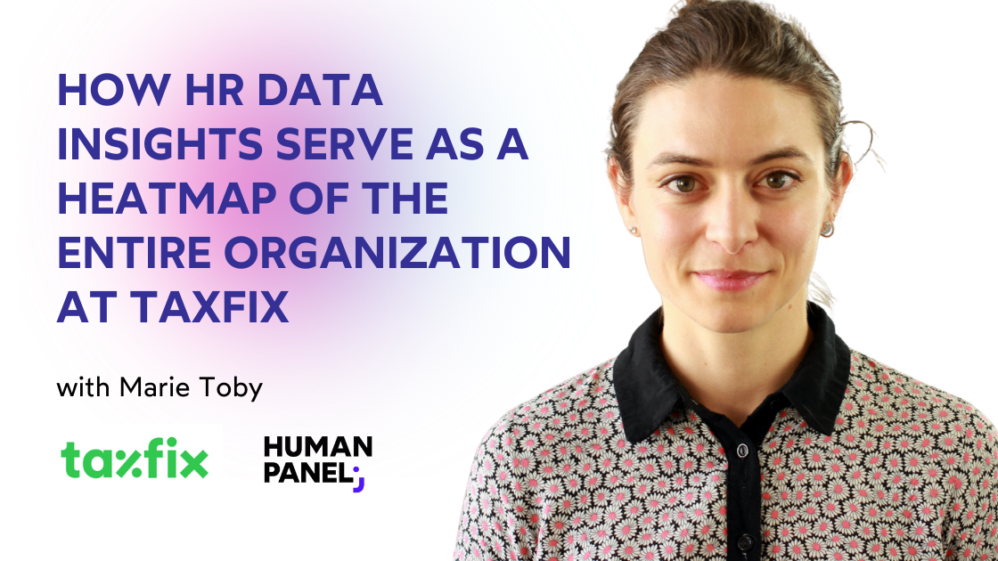Why we need more data-driven HR

We talk to Edyta Goryszewska-Szumska about the importance of data-driven HR, people analytics, and a wish list for today’s HR leaders.
There are few HR leaders with more experience than Edyta Goryszewska-Szumska. With more than 20 years as an HR director, she has gathered invaluable insights about human resources management and data-driven HR.
Edyta works at Dr. Max as Head of HR, but her roots are in the “hard” HR of payroll and documents. As she tells Human Panel, that’s where she learned the respect for numbers, metrics and data that we’re talking about today.
Human Panel: We often hear the phrase “data-driven HR.” But what’s the actual relationship between data and HR?
Edyta Goryszewska-Szumska: HR has always been a data-driven business, at least in terms of legal obligations and reporting. Yet we still work too little with data, often because of a lack of access.
Business leaders and HR managers often can’t back up their decisions with data, and we can’t blame them. Many companies still operate with outdated payroll records, and data scattered across disjointed systems. Data analysis also often leaves room for improvement, and the HR analyst position is still rare in most industries.

What kind of data is most valuable to HR executives?
The most common HR data are budget execution, compensation, administrative reports and payroll. But you can also measure many other components, such as training effectiveness, ROI of investment in people’s development, and employee learning.
The problem is that when companies track other metrics, they do so more for business reasons and cost optimization than for people analytics. For example, they measure turnover rates but don’t delve deeper, while in fact there’s no end to the more detailed questions we can ask: Which departments have the highest turnover rate? Which age groups? Does it depend on seniority, salary, or other factors in my company? Maybe it’s a regional issue related to a particular leader?
Another issue I notice is that companies are unwilling to share their data, for instance compensation policies. For many industries, there are no market benchmarks and no compensation reports.
Why not?
I would say that awareness is still low. Executives don’t want to share their information. They don’t understand that that’s harmful to everyone, and that HR data can be a basis for critical business decisions.
What’s more, many companies do collect data – compensation reports, for example – but they don’t analyze them. The conventional wisdom is that “hard” HR data, like absenteeism rates or overtime, is more valuable than “soft” metrics.
I think that’s because boards don’t see any value in such data. And that’s because no one has shown them that value.
Assuming someone did, how might people analytics change decision-making in large organizations?
We leaders – and I’m no exception – often make decisions based on our experience and “gut feeling.” That’s not because we don’t want to back up our findings with data, but because we lack the essential metrics. I believe that if we learned to be more efficient with data and execute data-driven HR, we would improve the position of HR in many companies.
I would love to be able to say to another manager: “Listen, it may not seem like it, but the data shows that your decisions are ineffective and are costing you money.”
Edyta Goryszewska-Szumska
Are you saying there’s still a lot of guesswork in HR?
A lot of HR decisions are still made because someone thinks it “might work.” At first sight, those decisions may seem cost-free, but sometimes they come with a hidden cost in employee time and commitment. Those are costs, too.
To make sound business decisions, we should always dig deeper and ask “why?” If we know that turnover rates are higher in a particular group, we should ask: “Why?” We shouldn’t try to experiment with additional training, raises, or benefits before we learn the cause of the problem. That’s a waste of time, money, and energy that could be put to much better use.
And even if we know that compensation is the reason for turnover, we should ask more questions: Where is it happening? In what region? What are the market benchmarks there? How about inflation? And what is the plan to get to market benchmark salaries?

So how do companies manage their workforce without people analytics?
Many companies have data analysts, but there are no dedicated HR data teams. I’ve implemented various payroll and HR systems in several companies, and I can say that there is a vast amount of data there, but even this information is hardly used.
For example, I once asked a large company to gather recruitment data: recruiter effectiveness, cost per hire, time per hire, and hiring source effectiveness. They spread out their hands and said “You’re the first person to ask for this.”
I wasn’t asking for extraordinary metrics, just primary data you want to know when you spend half a million dollars a year on recruitment. If you’re spending that much, you want to see if you’re spending it wisely.
As the head of HR, what other data would you like to have available?
Total Rewards Statements – barely known in Poland, popular in the U.S. This is a report that a company produces once a year to show what benefits its employees enjoy. It includes all the training, perks, extras like business cards, a phone – everything an employee receives from a company.
It would be great if employees knew what their company does for them. I would love to attach such a one-pager to their annual tax statement. But in most HR systems, that’s not yet possible. Each component is in a different system, and there’s no technology to help us.
Do you think such a report could be attractive for future employees and applicants?
Absolutely. A company’s employee investment could be an essential part of EVP, employer branding and employee branding. Why aren’t companies doing this? Not because the guys and gals at HR don’t know their capabilities, but because they have trouble capturing the data.
What else would make the life of the HR leader easier?
Automation. Let’s take recruitment. Often candidates don’t get a response to their application, which is a significant shortcoming in the hiring process.
I can’t imagine interviewing someone and leaving them without any feedback.
That’s my number one rule: always give feedback. If a company is concerned about its image, it should never swallow resumés like a black hole. Everyone who sends a CV or comes in for an interview should get a response, even if it’s just a quick “thank you.”
What do you think has been the most significant impact of the pandemic?
We’re all rich in experience of mass remote working, and it opens up new perspectives, for example benefits. Employers understand that sports cards or private medical care are no longer enough. In this context, MyBenefit offers a unique solution. Employers give their employees a monthly budget for the benefits they want. And the choices are vast: from books and movie tickets, to sports equipment, grocery shopping, and activities for kids. People can make their own decisions, and needs change quickly. I think that’s the only way to go.
Another thing I want to emphasize is that we as employers and organizations need to care more about the well-being of our employees. All the research shows that our mental health has deteriorated in the last months, and we’re probably facing another challenging autumn.
It is in the interest of employers to look after people’s well-being, and they will get more and more involved in their employees’ lives, but only out of necessity. We should care about people’s physical and mental health, giving them a broad selection of well-being benefits. Now is the best time to talk about this, as most budgets are set in September. Now is the time to act.
Act now! See how using easy people analytics can change your business. Make your HR managament easier and data-driven. Request our free demo and observe people analytics in action.




